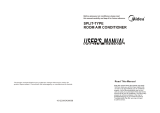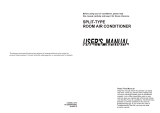
991010
OPERATING INSTRUCTIONS OPERATING INSTRUCTIONS
Special functions
Improving the quality of indoor air is one
of the purposes of an air conditioner.
This air conditioner is equipped with
ionizer or Plasma Dust Collector(model
dependent). With the anions generated
by Ionizer, the air circulation of the air
conditioner fills the room with refreshing,
natural and healthy air. The Plasma Dust
Collector generates a high voltage
ionization zone, through which the air is
converted to plasma. Inside the air most
of the dust, smoke, and pollen particles
are captured by the electrostatic filter.
CLEAN AIR function(Optional)
Airborne bacteria use the moisture on the
indoor heat exchanger to grow. Regular
drying of the exchanger prevents this
growth. By simply pressing the SELF
CLEAN button, the system will automatically
manage the process. This cleaning action
may be done as frequently as desired.
For cooling models, only the indoor fan is
active in low speed for 30 minutes and the
unit turns off automatically.
For cooling & heating models, the unit will
operate as in the following sequence :
FAN mode at Low fan speed--Heating
operation with LOW fan speed ---FAN
operation--Stop Operation---Turn off.
Note:
This function is only activated in COOLING
or DRY mode.
Before activation the air conditioner, it is
recommended to run the air conditioner
under cooling operation for about 30
minutes.
Pressing the SELF CLEAN or ON/OFF
button again during the cleaning cycle will
cancel the operation and turn the unit off.
SELF CLEAN function(Optional)
Refrigerant Leakage Detection (Optional)
When refrigerant leakage is detected,
the indoor unit will display EC code or
flash LEDs(model dependent).
Anti-mildew function(Optional)
Anto-restart function(Optional)
When turns off the unit on COOL, DRY,
AUTO (Cool) mode, the air conditioner
will continue operating for about 10
minutes (depending on models) with soft
wind. This will help to dry up the
condensed water inside the evaporator,
and prevent the mildew growth. Under
Anti-mildew operation, do not restart the
air conditioner until the unit is completely
off.
In event of power interruption such as a
blackout, the air conditioner stops once.
But it restarts automatically and performs
previous operation when the power supply
is resumed.
,
,
Louver Angle Memory Function(optional):
Within the scope of safety angle, the
horizontal louver angle is memorised
and will return to the position last selected
by user. If it exceeds, it will memorize the
boundary of safety angle. This will not
happen when Turbo or manual control
buttons are pressed or after a power
interruption. So we strongly suggest that
the open angle of the horizontal louver
should not be set too small, in case the
condensed water forms and drips from
the horizontal louver.
After 240 hours of operation, the indoor
display window will display and flash CL ,
this feature is a reminder to clean the Air
Filter for more efficient operation. After 15
seconds, the system will revert back to the
previous display again. When the CL
indicator appears and flashes, please
press the LED button on remote controller
for 4 times or press the Manual control
button for 3 or more times to clear the
registered hours, otherwise the CL
indicator will display and flash again for
another 15 seconds at the next time of
tarting the unit.
After 2880 hours of operation, the indoor
display window will display and flash nF ,
this feature is a reminder to replace the Air
Filter for more efficient operation. After 15
seconds, the system will revert back to the
previous display again. When the nF
indicator appears and flashes, please
press the LED button on remote controller
for 4 times or press the Manual control
button for 3 or more times to clear the
registered hours, otherwise the nF
indicator will display and flash again for
another 15 seconds at the next time of
starting the unit.
Air Filter Reminding Function(optioal)
Wireless Control Function(optional)
Wireless control allows you to control
your air conditioner using your mobile
phone and a wireless connection.
For the USB device access, replacement,
maintenance operations must be carried
out by professional staff.
Mute operation(optional)
Press the LED button on the remote
controller can turn off the indoor screen
display, and also turn off the Air
conditioner buzzer, which create a
comfortable and quiet environment.
Cleaning filter reminding function:
Replacing filter reminding function:
,
,
,
,
,
,
,
,
,
,
,
,












